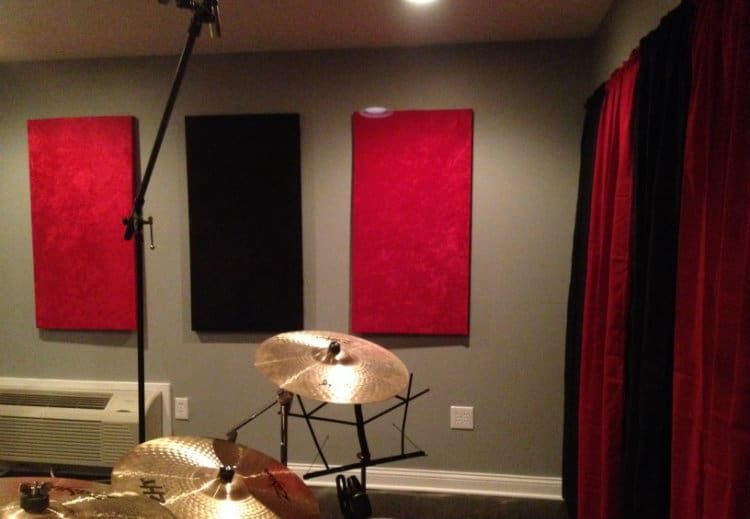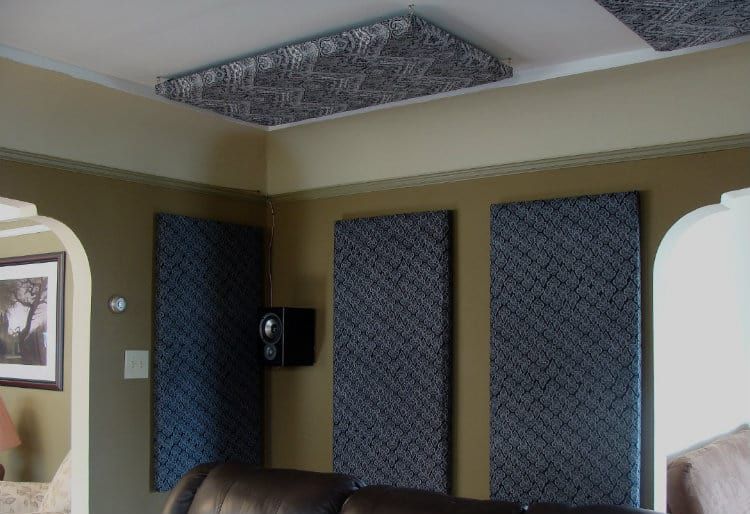Piano placement - Almost there!
-
I've been thinking about your room and the fact that you aren't loving the sound of the piano. Your room already has some good acoustical qualities (like its non-rectangular shape) but I think because the whole downstairs is open and all hard flooring, the sound is definitely going to be more overwhelming than what you're used to.
Before you do anything drastic like move the piano or voice the hammers, I'd try making some basic acoustic panels -- something like this, made from the 2" insulation type stuff you can get at home depot and covered in some kind of pretty fabric, would make a huge difference in the room. You can use command strips to experiment with the best place to hang them. I actually think if you used shapes and colors that mimic the square design of the rug, it could look like an amazing and very intentional design element while also taming the piano's sound a LOT.
Here's some instructions on how to make them: https://bettersoundproofing.com/diy-acoustic-panels/
And here (hopefully, if I did it right) are some photos to show you what I mean:


Incidentally, depending on what you make them out of, they can also double as corkboards so you can tack concert bills, photos, etc. to them if you want more of a casual office look.
-
Ooh, interesting! Thank you!
Re the material, does it need to be that insulation material? Could it be just foam pads, and then covered with some nice fabric?
I'm assuming the point is that, it needs to not be framed artwork with glass fronts, since that will just be more reflective. And I'm guessing that just a fabric wall hanging wouldn't suffice because the thickness of the foam pad is probably a key piece of the equation, right?
Ok, wait, I'll go read that article you linked.

-
The most available material to make these out of will be acoustic ceiling (T-bar ceiling) tiles. You can buy them individually in a lot of places.
The STC rating is what to look for. The higher the better.
-
Piano looks great! I think you’ll like having the light come in over your shoulders.
-
Piano looks great! I think you’ll like having the light come in over your shoulders.
Thanks Steve, I'll check out acoustic ceiling tiles as well.
@Steve-Miller said in Piano placement - Almost there!:
Piano looks great! I think you’ll like having the light come in over your shoulders.
Thank you!! I love having those windows there, and I love where/how I sit at the piano, I can look left out the window, or I can look forward into the living room.

-
Yes, framed artwork under glass won't help much with the sound, although if the frames are carved wood with interesting detail, they may break up the waves a tiny bit but probably not enough to matter and the glass may make matters worse. And as far as just fabric by itself, if it's something very thick like a quilt, it may help a bit but a piece of thin fabric won't help much at all. The key to these acoustic panels is that they are thick - 2 to 4" - and made from something that absorbs the sound and doesn't just bounce it back around. I work with an audio engineer so I can pry him for more details today if you want....he made all the ones that are hanging around our studios.
-
Hmmm, I don’t know if I’ll need any acoustic panels after all… it seems like the sound is tempered a bit as we’ve unpacked more. After last night’s practice session, I’m thinking it might be ok without them.
We’ll see though, it still might be a good idea just to add one panel on each of the three walls on the practice room… my new tuner is coming on Wednesday so I’ll ask him what he thinks as well.
-
Glad to hear that things are sounding better as you fill up the house. I suspect your house is similar to mine where your big open floor plan hard-floored downstairs is like a big soundboard and amplifying the sound. Hopefully as you add more furnishings, you'll dampen things down.
I did talk with my engineer guy a bit yesterday and I showed him a photo of your room with the piano in place. He said he'd put one big one (at least 2x4 feet) right above the piano and another on the wall across from it. The basic idea is to break up big long walls. He went through several different methods of making them yourself but the insulation stuff that he prefers (Owens corning 703) is somewhat expensive. He did not recommend ceiling tiles as they aren't as absorbent, but he did say you can use quilt batting or even regular batt insulation if you are looking to go cheaper (you have to build a wooden frame to encase that stuff).
Apparently you can also buy acoustic panels on amazon and then cover them with your own fabric. Or there's these, which I thought had a pretty cool aesthetic all on their own (and are free returns if you think they don't help the sound!) https://www.amazon.com/Art3d-Wood-Acoustic-Panels-Ceiling/dp/B0BWRP7CWB/ref=pd_ci_mcx_mh_mcx_views_0?pd_rd_w=1dlo3&content-id=amzn1.sym.352fa4e9-2aa8-47c3-b5ac-8a90ddbece20%3Aamzn1.symc.40e6a10e-cbc4-4fa5-81e3-4435ff64d03b&pf_rd_p=352fa4e9-2aa8-47c3-b5ac-8a90ddbece20&pf_rd_r=W5Y1RS8CFNG8NQ6MZN9Q&pd_rd_wg=4mqfB&pd_rd_r=0adc95e3-cb28-457a-8f3e-8f0aecdd6d1d&pd_rd_i=B0BWRP7CWB&th=1
Anyway, best of luck with the rest of your unpacking -- I can't wait to see pics of the whole house!
-
I have ordered some Owens-Corning 703 panels to put behind the upright that is coming Friday.
https://www.acoustimac.com/ Amazon also has them.
My place has windows and sliding glass doors, a large TV and glass covered pictures. Rugs cover a lot of the floor. There are two clerestory windows. The room is large enough for a 9' piano according to Larry Fine's formula, but the 5'11" grand was far too much.
There are no drapes, I don't like them. Not sure how far I am willing to go with acoustic modifications. -
I’ve been googling around all morning. I don’t think I want a solid color, like the ones you can get from those acoustic panel stores. The wooden slats might be nice depending on how you designed it, but I can’t figure out how they would attach to the wall if you're not doing an entire wall.
I was thinking maybe there would be a company that would print an image you supplied onto an acoustic panel, but I’m not finding one…
Anyway, in looking at the DIY options, it seems like it could get expensive fairly quickly because, in addition to the materials, we don’t have the right tools (staple gun etc)… maybe I’m over-estimating…
But, given how the piano room sounds right now, I’m thinking that I don’t need a lot of treatment. Like maybe three panels…
Oh, and the big thing I think is maybe to not hang the artwork I had in my piano room at the old house, because that’s all framed behind glass. Well except for one thing that’s not behind glass, I will keep that in there I think.
So I’m wondering if I can get some fabric canvas prints on thick frames, and then the question is, is there a benefit to adding foam to the back of the frame, the way one of those videos showed in the DIY panel article.
Hmmmmmm
-
Yes there would be a benefit to adding some foam (quilt batting/batt insulation) behind the fabric canvas print. The print would provide the frame for you so you wouldn't need to build anything. The engineer guy said when he was doing this on the super cheap, he'd just screw the plain yellow Owens Corning 703 panels to the wall and then hang like a fabric tapestry in front of them.
I think you are right to just get yourself unpacked and play the piano for a while to see if you really need anything. Maybe once everything is unpacked you'll grow to like the sound as-is.
Also, if you look at the reviews of those wood slat ones, there are people who are just hanging a panel or two - not sure how they are attached but it does look possible to just hang one by itself on the wall. I can't vouch for them as I have never used them - I just thought they were pretty and the lines and wood color might look nice with your rug.
-
Oh and SK, I don't want you to think you can't hang ANY glass prints in there - I think you'll be fine to hang a few pieces - it won't be much more reflective than the hard walls already are.
And in our area, you can borrow things like staple guns and other small tools from the library - maybe yours does something similar. If not, a staple gun is pretty cheap and surprisingly handy! Even if you go the route of finding a thick framed fabric print and stuffing the back with batt insulation, you'll need to attach something on the back of the print to hold the insulation in so I suspect you'll still want a staple gun at some point.
-
Acoustic art
https://www.acoustimac.com/acousticart -
I always recommend living with a new tuning/voicing/ placement/ piano/ room for at least a few weeks before making any further changes!
